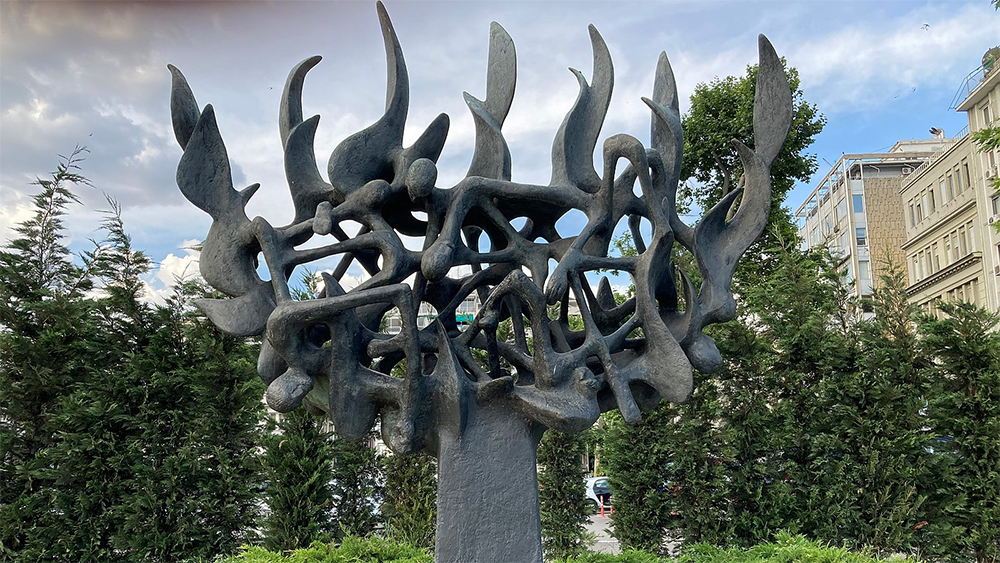Between 15 March and 10 August 1943, over forty thousand members of the Jewish community of Thessaloniki were rounded up by occupying German forces and deported to the notorious death camp of Auschwitz-Birkenau. More than 90% of the Jews who lived in Greece’s fabled “Jerusalem of the Balkans” perished at the hands of the genocidal Nazis in what was an unspeakable tragedy that led to the near extinction of one of Europe’s oldest and most thriving Jewish communities.
Eighty years later, as commemorative events took place in Greece, the Consulate General of Greece in Sydney, with the support of the Greek Orthodox Archdiocese of Australia, the NSW Jewish Board of Deputies and the Australian Archaeological Institute at Athens at the University of Sydney, hosted a lecture by the noted historian and scholar, Dr. Leon Saltiel, titled “The Holocaust in Thessaloniki and its blow to a 2000-years-old Community”.
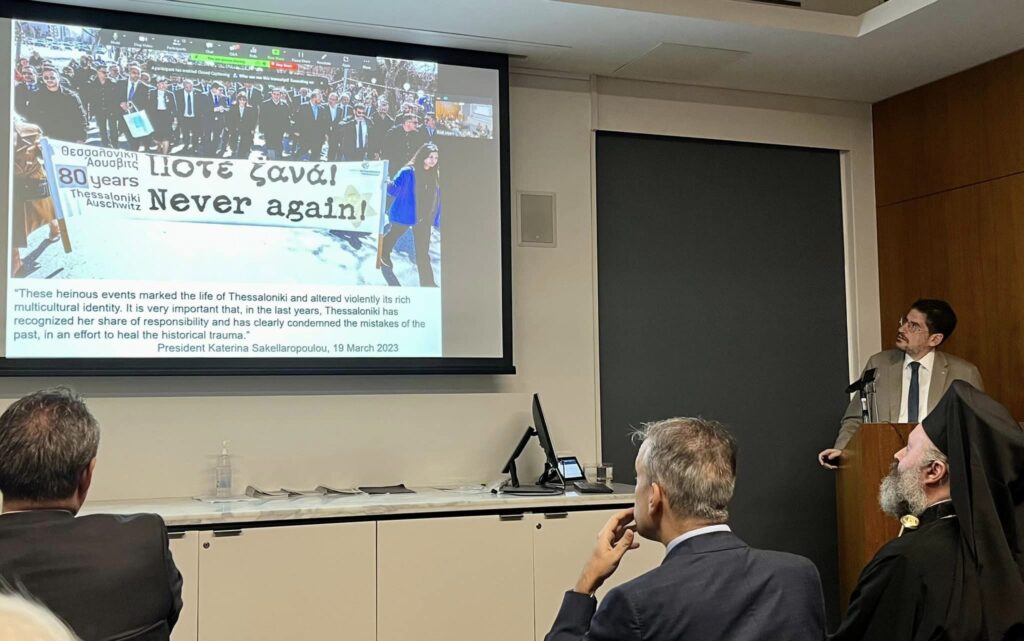
Leon Saltiel holds a PhD in Contemporary Greek History from the University of Macedonia in Thessaloniki and has also received post-doctoral fellowships at the Graduate Institute of International and Development Studies in Geneva and the Aristotle University of Thessaloniki. He has written extensively on the tragedy of the Thessaloniki Jews, most recently with the release of The Holocaust in Thessaloniki: Reactions to the Anti-Jewish Persecution, 1942–1943 and ‘Do Not Forget Me’: Three Jewish Mothers Write to their Sons from the Ghetto of Thessaloniki.

He has also spent many years working with the United Nations in Geneva and it was at the UN (and later on Cyprus) that the paths of the Greek Consul-General, Yannis Mallikourtis, and Leon Saltiel crossed.
The Consul General opened the proceedings by welcoming the opportunity for this lecture to raise awareness about the plight of the Greek Jews in Thessaloniki during World War II. Mr Mallikourtis recounted that in 2006 when he was part of the Permanent Mission of Greece to the United Nations in New York, he was privileged to hear personal testimony by the Holocaust survivor and Noble Laureate, Elie Wiesel, who addressed the Security Council about the then unfolding crisis in Dafour and reminded the delegates of how the silence of indifference and the apathy of the silent majority can lead to genocide.
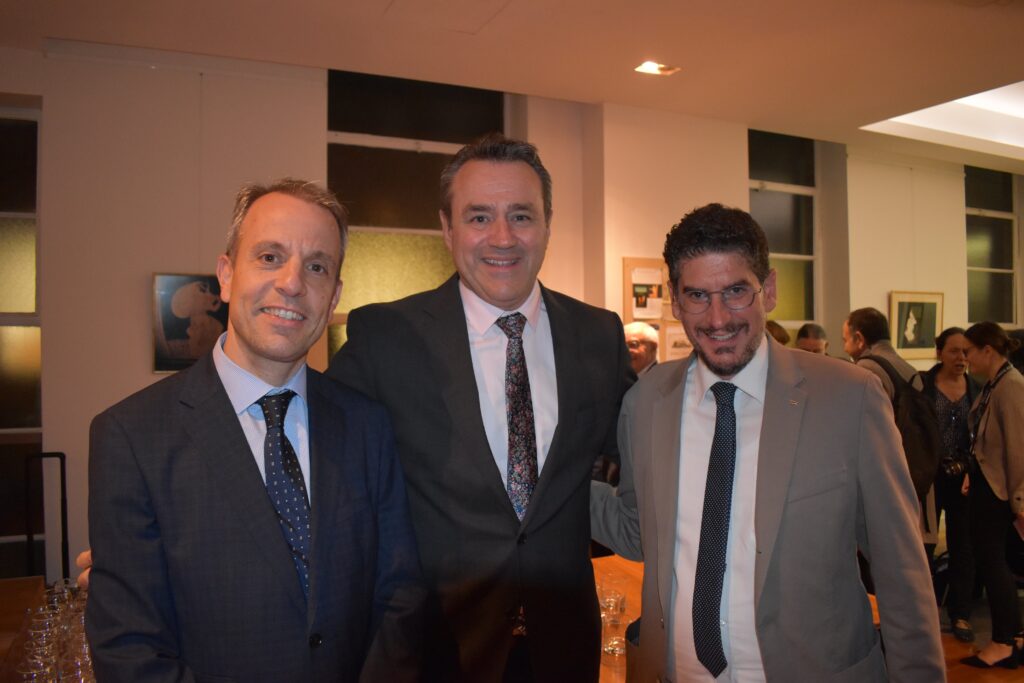
Leon Saltiel on the plight of the Jews of Thessaloniki
Greece’s second biggest city had been for centuries a major Jewish centre, often dubbed the “mother of Israel.” Paul the Apostle wrote the First Epistle to the Thessalonians (from the New Testamen)t at a time when there were small communities of highly assimilated Romaniot Jews living in Greece. Following the Spanish Inquisition of 1492 thousands of Sephardic Jews fled Spain and settled in Thessaloniki which was then under the Ottoman Empire. As Saltiel points out, the new arrivals, although they still spoke a strain of medieval Spanish known as Ladino, nevertheless transformed the city and dominated its economic, cultural and political life.
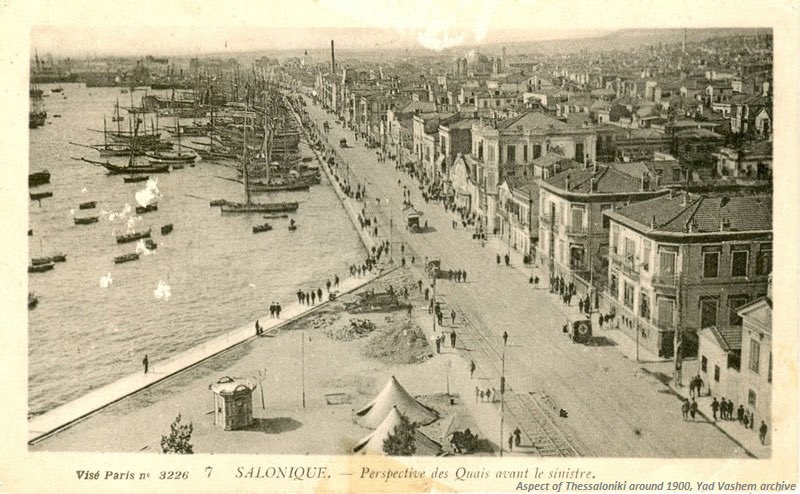
Despite being under Ottoman rule the port of Salonica (as it was then known) had become virtually a Jewish city with over 50,000 Jews (out of a total population of 150,000) and even after its absorption into the Greek state in 1912 and the great fire of 1917 which tore through large parts of the city including the Jewish quarters, it remained one of the leading centres of European Jewry.
Following the compulsory exchange of populations after the Asia Minor catastrophe in 1923, thousands of Greeks from the Ottoman Empire arrived in Thessaloniki and by 1943 the Jewish population accounted for approximately one-fifth of the city’s inhabitants.
During the 1930s there was a rise of antisemitism in Thessaloniki although the authoritarian Greek dictator Metaxas who assumed power in 1936 was not opposed to the Jews and had in fact dissolved the anti-Semitic Republican political movement known as the National Union of Greece (Εθνική Ένωσις Ελλάδος).
At the outbreak of the war in Greece in October 1940 thousands of Greek Christians and Jews fought together to push back the Italian invaders. Unfortunately, things changed when Germany entered the war and overtook Greece and Crete in 1941. The German forces that occupied Thessaloniki were to create a hellish nightmare for the Jewish souls of Thessaloniki culminating with their deportation to the death camps.
Black Sabbath
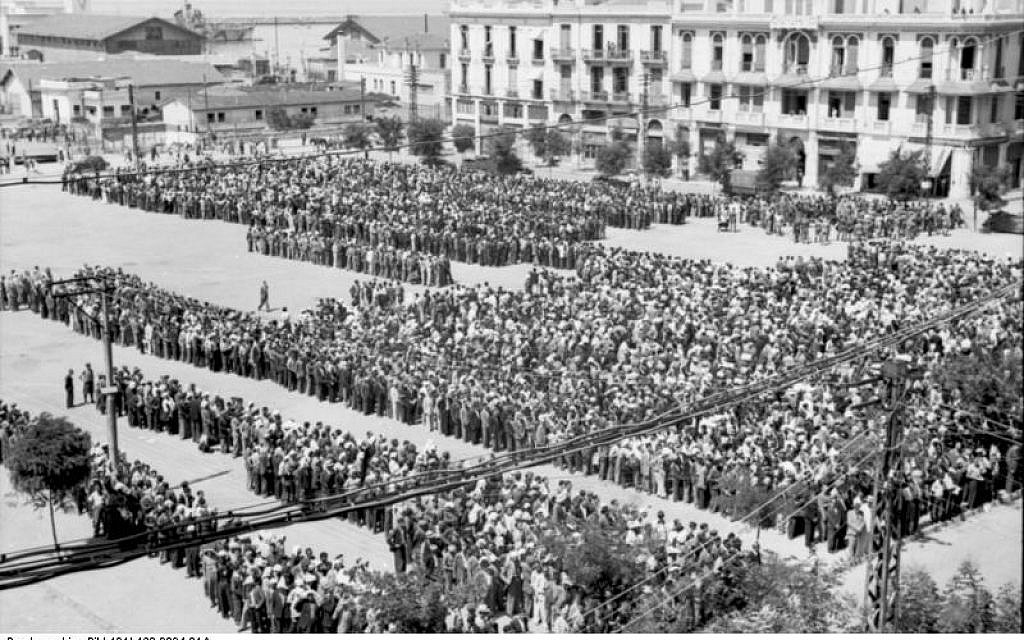
The first real inkling of what was to come occurred on Saturday, 11 July 1942 when approximately 9,000 Jewish males aged eighteen to forty-five were ordered to assemble in Eleftheria (or Liberty) Square in the centre of the city to register as labourers for heavy construction works which the Nazi invader wanted to undertake throughout northern Greece.
Crowds gathered to watch the spectacle of these men surrounded by armed soldiers, forced to stand in the hot sun for hours, and deliberately taunted and in many cases beaten. Others were made to perform humiliating gymnastics.
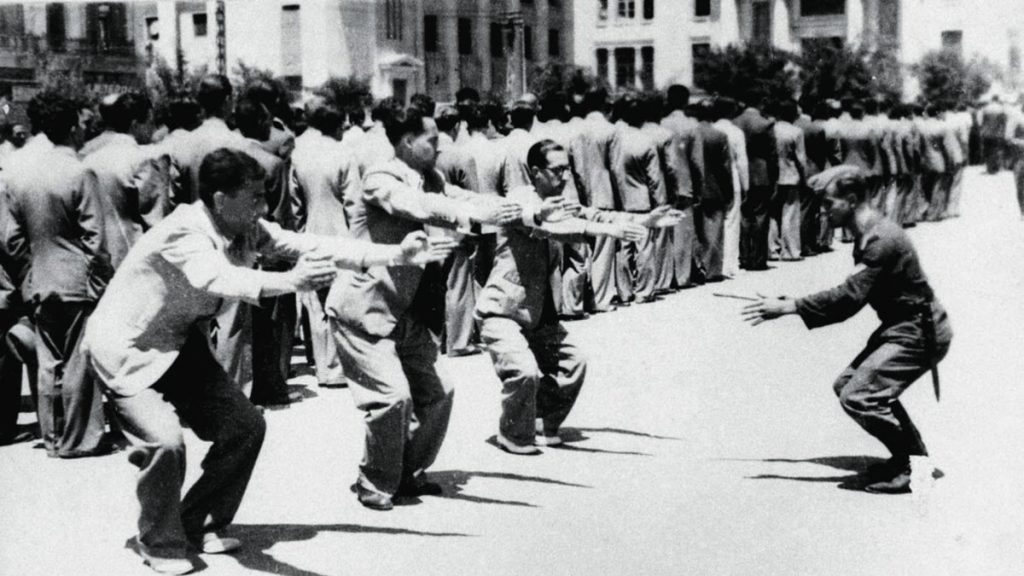
Hundreds of Jewish forced labourers would lose their lives in the arduous work conditions they had to endure. The rest were only freed after the Jewish community managed to raise a large sum of money to pay off the Nazis.
The Nazi occupiers also prevailed upon the local authorities to assist with the erasing of Thessaloniki’s Jewish topography, starting in December 1942 with the destruction of the city’s ancient Jewish cemetery (many of the ancient tombstones ending up as building material for roads and fortifications) and the removal of Jewish street names throughout the city.
In February 1943 the notorious yellow star was introduced and all people of the Jewish faith were required to wear publicly the star, inscribed “Jude” and “Evraios” in German and Greek. Jews were also forced to vacate their homes and relocate to several ghettos that were constructed for their confinement. Looting and pillaging of Jewish property broke out.
In March 1943 the deportations started.

The perils of indifference
The Primate of the Greek Orthodox Church in Australia, Archbishop Makarios, in his forward to the presentation by Dr Saltiel, spoke of the profound affliction caused by the Nazis and the utter destruction and carnage wrought on the Jewish population of what came to be known as the City of Ghosts, noting that to this day we have not fully comprehended the lessons of the past.
His Eminence also spoke of the support from the Greek Orthodox community and instanced the well-known examples of Archbishop Damaskinos of Athens, Metropolitan Chrysostomos of Zakynthos and Metropolitan of Ioakeim of Demetrias (Volos) who used their best efforts to undermine the efforts of the Nazis to deport the Jews living within their ecclesiastical communities.
Archbishop Damaskinos actively opposed German policy and eventually resorted to subterfuge, including the issuing of false baptismal certificates and encouraging his clergy to provide them refuge in monasteries and orphanages. He famously wrote a strongly worded letter of objection to the Nazi-imposed Greek prime minister when he learned of the deportation of the Greek Jewish community of Salonika:
"In our national consciousness, all the children of Mother Greece are an inseparable unity: they are equal members of the national body irrespective of religion or dogmatic differences."
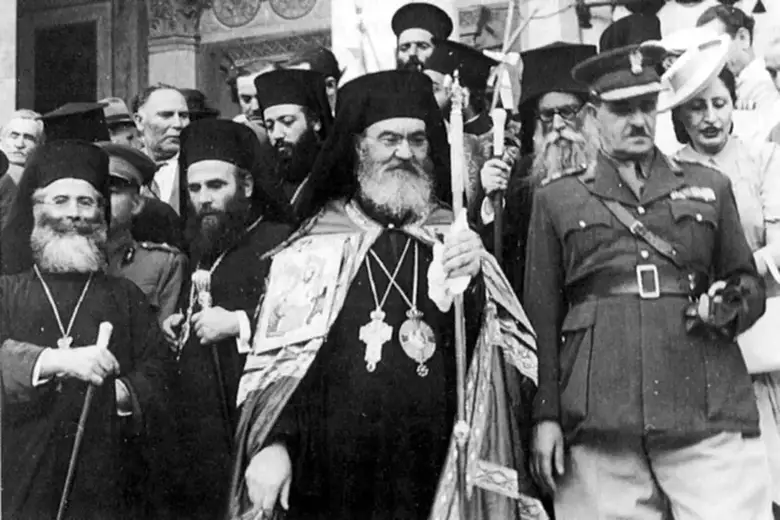
The fact that no Greek Jews were harmed on Zakynthos was due to the heroic efforts of the Metropolitan who, together with the mayor, Loukas Karrieras, frustrated the local German commander’s demand for the names of all the Jews on the island by providing a list with just two names, Chrysostomos and Karrieras.
More than seventy percent of the Jewish population in Volos also survived the war. Metropolitan Ioakeim responded to demands by the Nazi authorities for a list of all Jews living in the city by responding “I am a Jew” and that in the eyes of God there is neither Jew nor Greek. More than 700 Jews fled from the town and were protected by villages against Nazi persecution.
The local Greek Christian communities through both passive and subversive forms of resistance actively undermined the German policy of deportation to help their Jewish brethren evade the Nazi authorities.
But as the noted historian Mark Mazower, author of Salonica, City of Ghosts: Christians, Muslims, and Jews, 1430-1950, has pointedly asked, where were the bishops and clergy of Ioannina, Arta, Preveza, Veria, Corfu, Rhodes and Hania whose Jewish populations were totally destroyed?
And sadly the political, religious and civic leaders of Thessaloniki failed to stand up for their Jewish brothers and sisters and that silence of denial proved to be deadly.
We Remember
Greece has started to come to terms with this dark chapter in its recent past.
In 1997, the year when Thessaloniki was the EU’s European Capital of Culture, the first Holocaust Monument in all of Greece was erected in the city.
Holocaust Remembrance Day is now celebrated each year on 27 January.
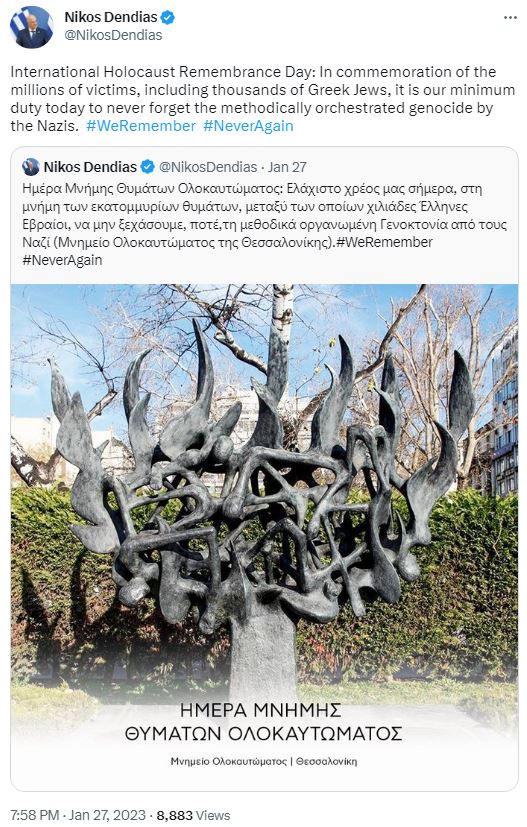
The former Mayor of Thessaloniki, Yannis Boutaris, who served from 2010 to 2019, has also been a strong voice for remembering the Jews of Salonika. At his swearing-in ceremony at the commencement of his second term in office in 2014 Mayor Boutaris famously wore a yellow star on his lapel bearing the word “Jude” (Jew) in protest at the undignifying rise of the neo-Nazi and Holocaust-denying Golden Dawn party in Greece.
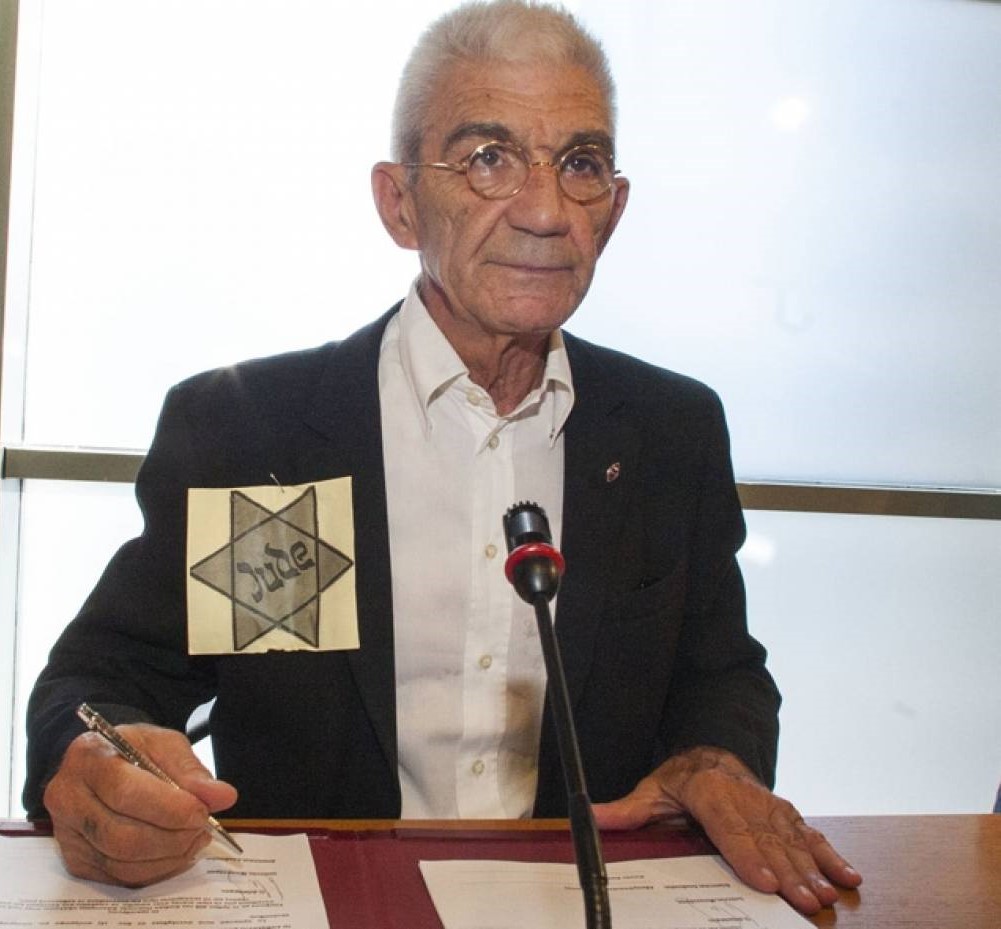
Boutaris often spoke of the silence and indifference of the city to the drama of the Jews during the years following the Holocaust and in 2018 referred to the shame for “everything that happened, for everything we did and most importantly for everything that we could not or did not want to do”.
As Leon Saltiel has written, while the dead can never return, at least the living can pledge to keep their memory alive and never repeat the mistakes of the past.
On 19 March 2023, on the occasion of the 80th anniversary when deportations began, the President of the Hellenic Republic, Katerina Sakellaropoulou, marched with senior Greek and Israeli officials and Holocaust survivors and their families, and together they followed the path that the Germans forced the city’s Jewish population to take from Liberty Square to the old train station, from where they were carted like cattle by freight train to the Auschwitz-Birkenau concentration camp.
‘Never Again’ was the cry of the mourners.
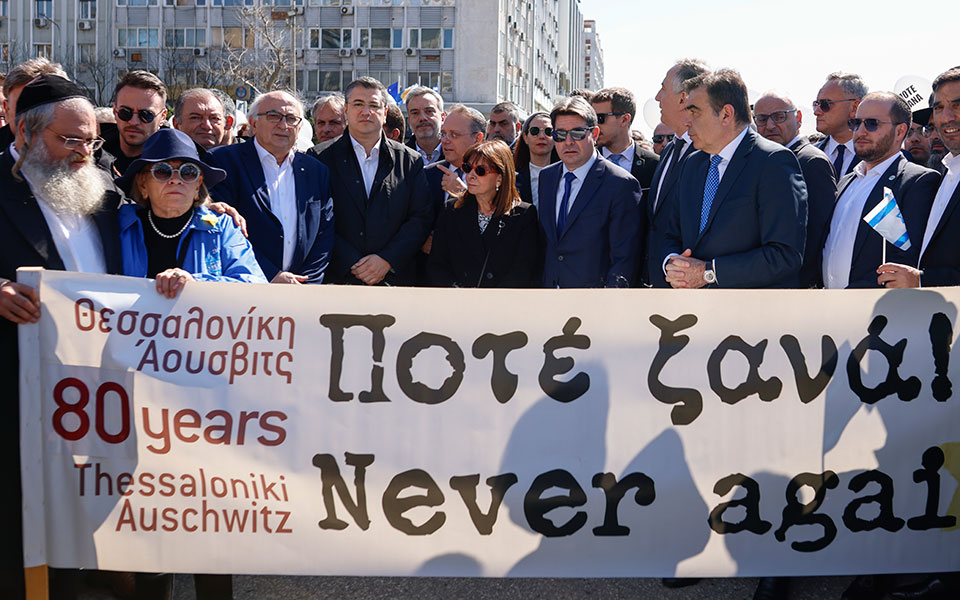
Only one year earlier the Greek President recognised that it is important for Greece to acknowledge the sins of the past when she declared:
It is extremely important that over recent years Thessaloniki has assumed its share of responsibility for actions and omissions of the past. It has recognised the historical wound created by the indifference, complacency, and anti-Semitism of the inter-war years, and has condemned in the most emphatic manner the Nazi and fascist ideologies that cultivate violence and racism.
It was therefore both poignant and moving to watch a short video replayed by Dr Saltiel during his presentation of the President of the Republic reading excerpts from the book "Do Not Forget Me", which featured incredible eyewitness accounts in the form of letters from three Jewish women bound for Auschwitz who spent their last weeks in the Thessaloniki ghetto writing to their sons who had managed to get to Athens.
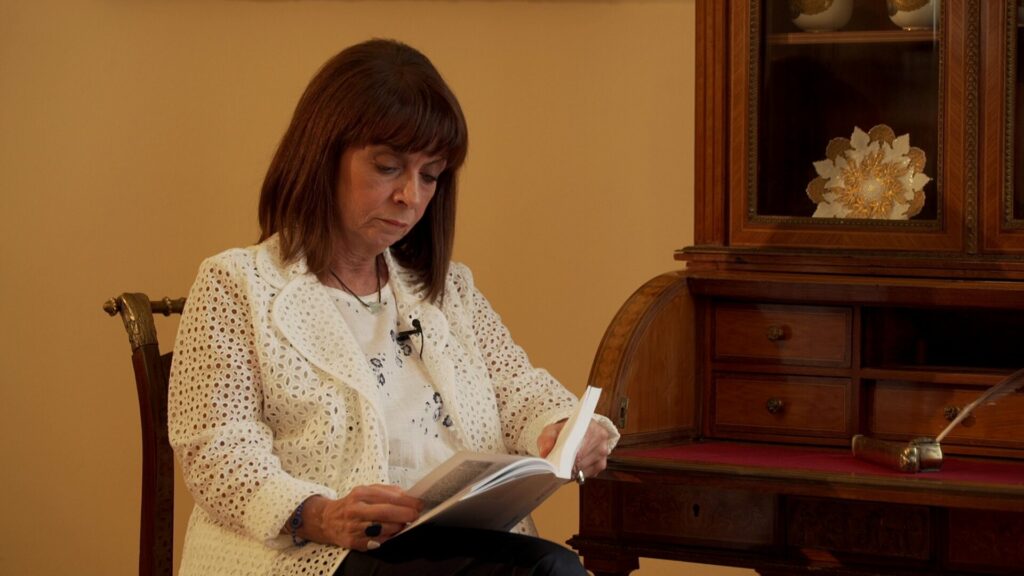
The Greek President, who was visibly shaken by the raw emotional intensity of a mother’s lament, read a letter, dated 8 April 1943, from Neama Kazes to her sons:
My dear Maurice and Berto
I received your letter, and it’s clear to me that you don’t know what we’re going through. Only in stories or at the cinema can you see scenes similar to what we’re going through this week.
We have sat in bed fully dressed for two nights waiting for someone to knock on the door, wake us up and take us. Everyone is selling one’s personal belongings in the streets and buying things to eat. We waste money as if it were water, we throw money out of the window. Personal belongings are distributed to whoever is interested. The crying, the groaning, the tragedies cannot be described.
The streets are packed with people trying to catch and steal people’s belongings like a bunch of hyenas circling a dead horse … It’s like living your worst nightmare, day and night, in indescribable anguish. Everyone has a cart ready outside one’s door.
I don’t sleep at night, and my only thoughts are of you, that this terrible wind doesn’t blow in your direction as well. May God bless you, my dear children, as my thoughts will become even more muddled once I no longer know where you are.
I embrace you with all my heart and soul, my dearest children. May the good Lord have mercy on the innocent who aspire only to simple family pleasures. May God watch over you and keep you from all evil.
Your mother only has one thought on her mind: to see her children well.
Your mother, Neama
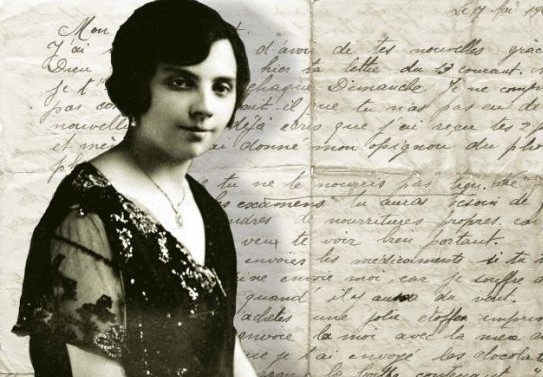
Never Again
The deportation and extermination of almost the entire Jewish population of Thessaloniki in 1943 is a dark chapter in our history and collective memory. Never Again.
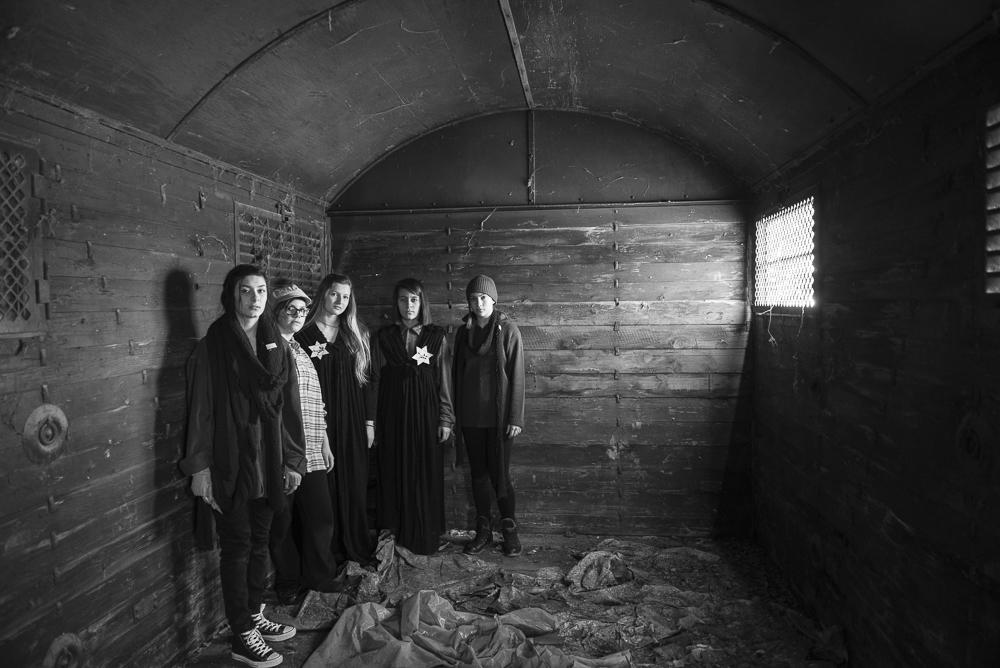
And as the dark clouds of Golden Dawn and other neo-Nazi καθάρματα once again gather over Thessaloniki, we must never forget.
May the memory of all those who died in the Holocaust be eternal.
George Vardas is the Arts and Culture Editor

